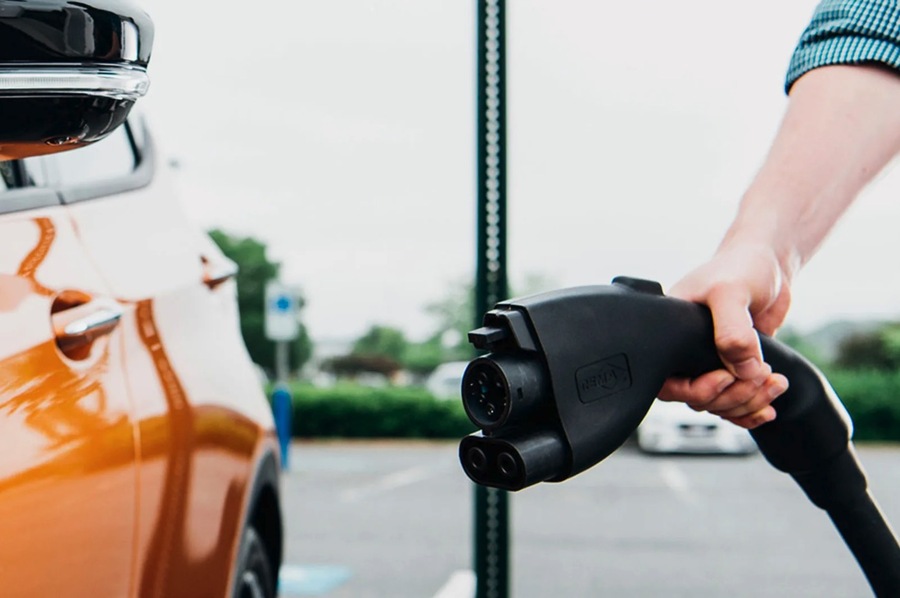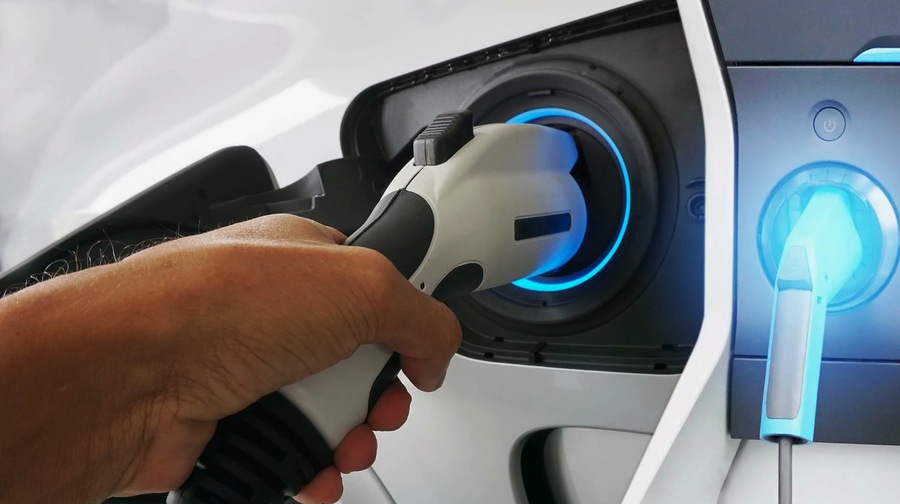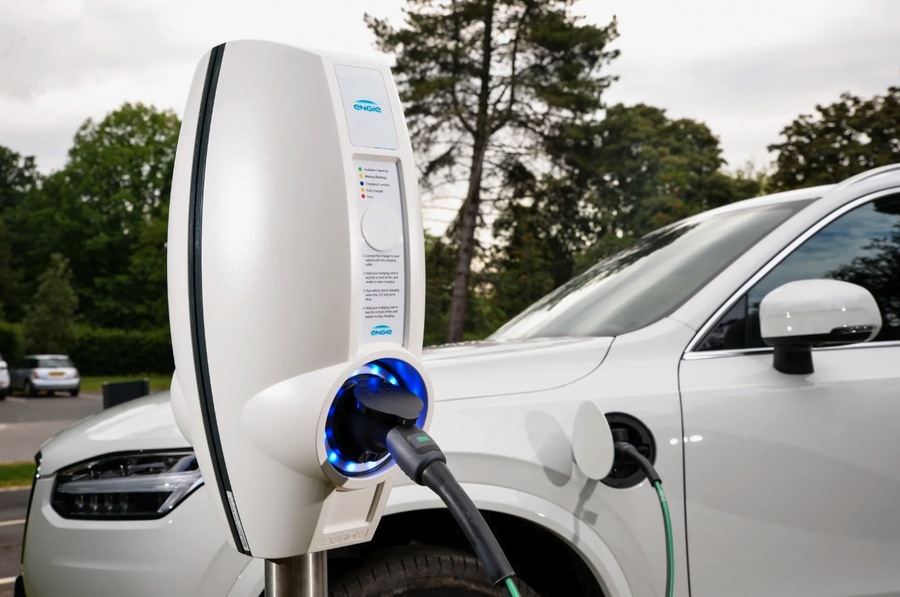An electric car is a vehicle that uses one or more electric motors for propulsion, powered by electricity stored in batteries or another energy storage device. Unlike traditional internal combustion engine (ICE) vehicles, electric cars produce zero emissions during operation, making them an environmentally friendly alternative. They offer smooth and quiet driving experiences, high efficiency, and lower operating costs. The absence of an exhaust system also means fewer pollutants and a cleaner environment, which contributes significantly to reducing urban air pollution and combating climate change. For those interested in experiencing the benefits of electric vehicles, Al Mizan Car Rental offers a range of options to suit your needs.
History and Development of the Electric Car
The development of electric cars can be traced back to the early experiments with electricity and electric motors. The journey from concept to the modern electric vehicle (EV) we know today involved several key inventors and innovations.
Early Developments and Inventors
Benjamin Franklin and Early Electric Motors
The concept of harnessing electricity for practical use dates back to the 18th century with the work of Benjamin Franklin and other pioneers. Their experiments with electricity laid the groundwork for future innovations, including the development of electric motors, which are crucial for electric vehicles. Franklin’s famous kite experiment and his studies on electricity’s properties sparked curiosity and further research, leading to the development of devices that could store and use electrical energy.
Robert Davidson and the First Electric Locomotive (1837)
In 1837, Scottish chemist Robert Davidson built the first known electric locomotive in Aberdeen, Scotland. Davidson’s locomotive used galvanic cells (batteries) to power electric motors, demonstrating the potential of electric propulsion for transportation. This invention marked a significant milestone in the history of electric vehicles. Despite its limited range and power, Davidson’s electric locomotive showcased the feasibility of electric propulsion and inspired future developments in electric vehicle technology.
Gaston Plante and the Rechargeable Battery (1859)
French physicist Gaston Plante invented the lead-acid battery in 1859, which was the first rechargeable battery. Plante’s battery provided a practical and reliable source of electricity for electric vehicles, paving the way for further developments. The ability to recharge batteries was a crucial advancement, making electric vehicles more feasible for everyday use. Plante’s invention was particularly significant because it allowed for the storage of electrical energy that could be replenished, greatly enhancing the practicality and potential of electric vehicles.
Gustave Trouvé and the First Electric Vehicle (1881)
In 1881, French inventor Gustave Trouvé showcased the first electric vehicle designed for human transport. Trouvé’s tricycle, powered by a rechargeable battery, was a significant step forward in the development of electric cars. His invention demonstrated the practicality of electric propulsion for personal transportation. The tricycle featured a compact design and a reliable power source, making it a pioneering example of an electric vehicle intended for daily use and travel.
Thomas Parker and Early Electric Cars (1884-1888)
English inventor Thomas Parker built one of the first practical electric cars in the late 1880s. Parker’s electric car used non-rechargeable batteries, highlighting the need for further advancements in battery technology. Despite this limitation, Parker’s work contributed to the growing interest in electric vehicles during the late 19th century. Parker’s contributions were vital in demonstrating the potential for electric cars to be used in everyday settings, laying the foundation for future improvements and innovations in electric vehicle technology.

Evolution of Electric Cars
Early 20th Century
The early 20th century saw a surge in the popularity of electric cars. Companies like Detroit Electric and Baker Electric produced electric cars that were quiet, easy to drive, and ideal for short trips in urban areas. However, the development of affordable internal combustion engines and the discovery of large petroleum reserves led to the decline of electric vehicles by the 1920s. Despite their initial popularity, electric cars were overshadowed by gasoline-powered vehicles, which offered greater range and convenience due to the widespread availability of gasoline.
Mid-20th Century
Interest in electric vehicles resurfaced during the 1960s and 1970s due to concerns about air pollution and the oil crisis. Automakers experimented with electric and hybrid vehicles, but technological limitations and high costs prevented widespread adoption. The oil embargoes of the 1970s, which highlighted the vulnerabilities of reliance on fossil fuels, spurred renewed interest in alternative energy sources, including electric vehicles. However, the technology at the time was not advanced enough to produce electric cars that could compete with gasoline-powered vehicles in terms of range, performance, and cost.
Late 20th Century to Present
The late 20th and early 21st centuries marked significant advancements in electric vehicle technology. The development of lithium-ion batteries, improvements in motor efficiency, and advancements in electronic controls led to the resurgence of electric cars. Companies like General Motors introduced the EV1 in the 1990s, a modern electric car that garnered attention but was ultimately discontinued. The introduction of hybrid vehicles like the Toyota Prius also played a crucial role in bringing electric and partially electric vehicles into the mainstream. The rise of Tesla in the 2000s, with its focus on luxury electric cars with long ranges and high performance, revolutionized the electric vehicle market and demonstrated the commercial viability of electric cars.
Popular Electric Cars of Today
Today, electric cars are more popular and advanced than ever before. Here are some of the most popular electric cars on the market:
Tesla Model S
The Tesla Model S, introduced in 2012, is a luxury electric sedan known for its impressive range, high performance, and advanced technology. It has set new standards for electric vehicles and continues to be a benchmark in the industry. The Model S offers features such as autopilot capabilities, a minimalist interior with a large touchscreen display, and over-the-air software updates that continuously improve the car’s performance and functionality. Its long-range battery options and high-speed performance have made it a favorite among electric vehicle enthusiasts and luxury car buyers alike.
Nissan Leaf
The Nissan Leaf, launched in 2010, is one of the best-selling electric cars globally. It offers an affordable entry point into electric vehicle ownership and has undergone several updates to improve range and features. The Leaf’s user-friendly design, reliable performance, and affordable price point have made it a popular choice for eco-conscious consumers looking for a practical and efficient electric car. With its expanded battery options and advanced safety features, the Leaf continues to be a leader in the compact electric vehicle market.
Chevrolet Bolt EV
The Chevrolet Bolt EV, introduced in 2016, is a compact electric car that offers a long range at an affordable price. It has been praised for its practicality, performance, and value for money. The Bolt EV’s spacious interior, advanced infotainment system, and long-range capabilities make it a versatile and attractive option for a wide range of drivers. Its success has demonstrated that electric vehicles can offer both affordability and practicality without compromising on performance or range.
BMW i3
The BMW i3, launched in 2013, is a unique electric car with a distinctive design and innovative use of sustainable materials. It offers a premium electric driving experience and has a loyal following. The i3’s carbon fiber-reinforced plastic body, use of recycled materials, and advanced technology make it a standout in the electric vehicle market. Its compact size and agile handling make it well-suited for urban environments, while its luxurious interior and cutting-edge features provide a premium driving experience.
Tesla Model 3
The Tesla Model 3, introduced in 2017, is a more affordable option compared to the Model S and has quickly become one of the best-selling electric cars. It combines impressive range, performance, and advanced technology at a competitive price point. The Model 3’s sleek design, powerful electric motors, and advanced driver-assistance features have made it a popular choice among consumers looking for a high-quality electric car. Its success has helped to further cement Tesla’s reputation as a leader in the electric vehicle industry and has contributed to the growing adoption of electric vehicles worldwide.
The Importance of Electric Cars Today
Today, the production and adoption of electric cars are more relevant than ever, especially given the pressing environmental concerns. Electric cars offer a solution to reduce greenhouse gas emissions, decrease dependence on fossil fuels, and improve air quality in urban areas. Countries around the world are incentivizing the use of electric cars through subsidies, tax breaks, and investments in charging infrastructure. The shift towards electric vehicles is seen as a critical step in addressing climate change and achieving sustainable transportation goals.

China
China is leading the world in electric vehicle adoption, with approximately 14 million electric cars in operation. The Chinese government has implemented policies to encourage the production and use of electric vehicles, making significant investments in charging infrastructure and offering subsidies to manufacturers and consumers. The rapid growth of the electric vehicle market in China is driven by the government’s efforts to reduce air pollution, decrease reliance on imported oil, and position the country as a leader in the global electric vehicle industry.
Environmental and Economic Benefits
Electric cars are not only environmentally friendly but also economical to maintain. They have fewer moving parts compared to internal combustion engines, leading to lower maintenance costs. Additionally, electric cars offer a quiet and smooth driving experience, and their instant torque provides excellent acceleration. The lower cost of electricity compared to gasoline also means that operating an electric car is generally cheaper. These benefits make electric cars an attractive option for consumers looking to reduce their environmental impact and save money on fuel and maintenance.
Experience Electric Cars with Al Mizan Car Rental
For those looking to experience the advantages of electric cars, Al Mizan Car Rental in Dubai offers the famous Tesla Model X 2021 at a special price of 1250 AED per day, instead of the usual 2200 AED. Renting an electric car allows you to enjoy its benefits without the commitment of ownership, making it an excellent way to explore the future of transportation. The Tesla Model X offers a luxurious and powerful driving experience, with features such as falcon-wing doors, a spacious interior, and advanced autopilot capabilities. Renting this high-performance electric SUV provides an opportunity to experience the latest in electric vehicle technology and enjoy the environmental and economic benefits of electric driving.
Conclusion
The development of electric cars has been a remarkable journey, from early experiments in the 19th century to the advanced, efficient vehicles available today. As concerns about environmental sustainability grow, electric cars offer a viable and increasingly popular alternative to traditional internal combustion engines. Whether you’re considering purchasing an electric vehicle or simply want to experience one, the options available today demonstrate the significant advancements and potential of electric transportation. Electric cars are set to play a crucial role in the future of transportation, offering a cleaner, more sustainable way to travel. As technology continues to improve and infrastructure expands, electric cars will become even more accessible and practical for consumers worldwide.

Skier, father of 3, drummer, Bauhaus fan and doodler. Operating at the junction of minimalism and function to craft experiences both online and in real life. Let’s make every day A RAZZLE-DAZZLE MUSICAL.
